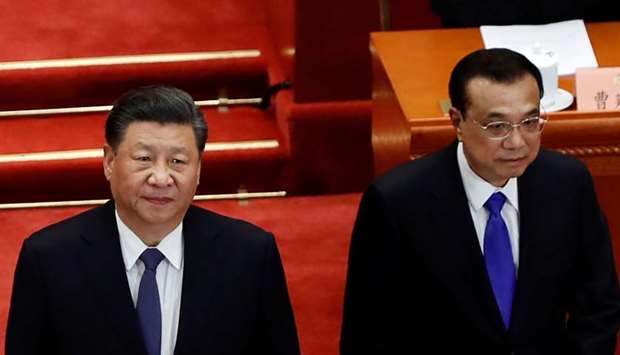China’s annual high-level political meetings opened yesterday with a minute’s silence for the victims of the coronavirus pandemic, which has claimed over 4,600 lives in the country since emerging late last year.
Delayed by two months because of the outbreak, the Chinese People’s Political Consultative Conference (CPPCC) — a largely ceremonial advisory body — began its first session a day before the start of the country’s most important legislative congress.
More than 2,000 delegates from across the country bowed their heads in silence after singing the national anthem in Beijing’s Great Hall of the People. The virus began in the central city of Wuhan before spreading around the world, infecting more than 5mn people and killing over 328,000.
President Xi Jinping and the rest of the 25-member Politburo — the Communist Party’s top leadership body — were in the middle of the central stage, the only attendees not wearing face masks.
State television showed hundreds of masked delegates in black business suits walking up the steps of the Great Hall shortly before the session began.
Known as the “Two Sessions”, the yearly gathering of the CPPCC and the National People’s Congress (NPC) involves thousands of delegates flocking to the capital for intensive meetings to discuss policy.
Originally scheduled for March, this year’s meetings will be squeezed into around seven days instead of the usual 10 days, according to state media.
Delegates were required to undergo multiple nucleic acid tests for the virus before taking part in the sessions, and must wear face masks throughout.
The number of journalists allowed into the Great Hall has been massively reduced with many press conferences and delegate interviews moved online as a virus prevention measure. Today the NPC will open in highly choreographed meetings to bills, budgets and personnel moves.
Ministers will also reveal key economic targets, military budgets and other strategic priorities that shed a light on the thinking of Communist Party leaders, as China emerges from the devastating aftermath of the coronavirus.
Issues including epidemic prevention and control, poverty alleviation, Hong Kong policy and job creation are expected to be high on this year’s agenda.
What to expect from China’s annual meeting of parliament
About 3,000 delegates to the annual gathering of China’s parliament, the National People’s Congress, will gather in Beijing today to discuss political and economic policy. Below is an overview of China’s top legislature and this year’s meeting, widely expected to be shorter than the usual 10 days.
Issues
On opening day, Premier Li Keqiang typically announces key annual economic targets in a state-of-the-nation style address.
This year, all eyes will be on the government’s 2020 gross domestic product growth target – if there is one at all – after GDP contracted in the first quarter for the first time in decades due to the new coronavirus outbreak. Li may also announce fresh measures to stimulate an economy hit by the worst public health crisis since the founding of the People’s Republic of China in 1949. The defence budget is expected to be unveiled on opening day too, seen as a gauge of the extent China may ratchet up its military capabilities this year. During parliament, the NPC is also expected to pass China’s first civil code, wide-ranging legislation that, among other things, will formalise property and personal rights as part of President Xi Jinping’s plan to reform the legal system. Amid the global coronavirus pandemic, lawmakers will also likely discuss measures to contain any potential flare-up in new cases and steps to prevent a second wave in the longer run.
Functions
The NPC normally meets every March to pass major bills, approve the budget and endorse personnel nominations. Its Standing Committee meets regularly to approve other legislation. The gathering this year was postponed due to the epidemic, the first time the NPC has been delayed since China adopted the March schedule in 1995. The NPC is generally considered a rubber stamp for the ruling Communist Party’s policies and decisions.
Membership
Delegates represent China’s 31 provinces, municipalities and autonomous regions, as well as Hong Kong, Macau and the military. There are also delegates for Chinese-claimed Taiwan, mostly made up of defectors and their descendants but not elected by Taiwan’s people.
Votes
Votes always follow the Communist Party’s wishes and generally pass by an overwhelming majority, but delegates have in the past departed from the party line to vent frustration over issues such as corruption and crime. All citizens above the age of 18 are technically allowed to vote for delegates and be elected to the NPC, but most delegates are hand-picked by local officials.
Meetings
Parliament meets in the Great Hall of the People to the west of Tiananmen Square in the heart of Beijing. The main auditorium can seat 10,000 people. The number of delegates attending is expected to remain unchanged, with China well past the February peak of the coronavirus epidemic and measures to prevent any return of the virus to the Chinese capital in place. Typically, there are news conferences during parliament, including a news conference by the government’s top diplomat, State Councillor Wang Yi, and the premier’s annual press conference on the last day. But the number of such conferences is expected to be reduced this year due to precautionary coronavirus measures. The high-profile but largely ceremonial advisory body, the Chinese People’s Political Consultative Conference (CPPCC), meets in parallel with the NPC. It is made up of business magnates, artists, monks, non-communists and other representatives of broader society, but has no legislative power. The CPPCC opened yesterday.

Chinese President Xi Jinping and Premier Li Keqiang arrive for the opening session of the Chinese People’s Political Consultative Conference (CPPCC) at the Great Hall of the People in Beijing.
